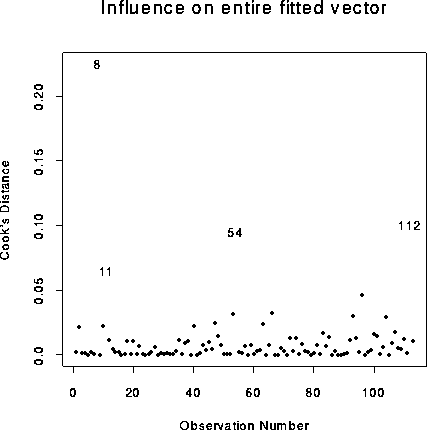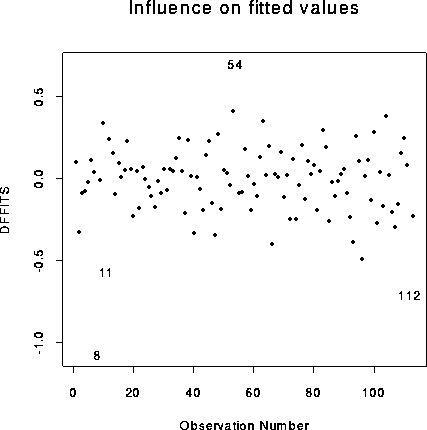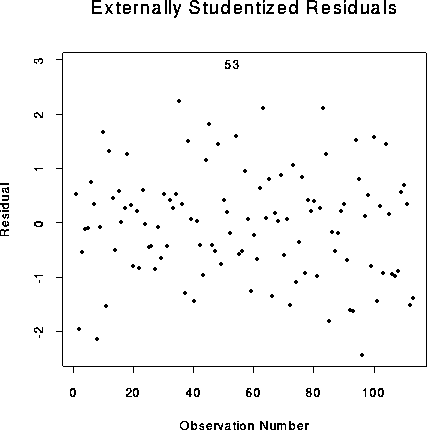Reading: Chapters 9 and 10.
In addition to the residual plots already discussed there are a number of formal statistical procedures available for diagnosing problems with the fitted model.
Problems with individual data points


![\begin{displaymath}D_i = \frac{\hat\epsilon_i^2}{p\mbox{MSE}}\left[\frac{h_{ii}}{(1-h_{ii})^2}\right]
\end{displaymath}](img11.gif)
![\begin{displaymath}DFBETAS_{k(i)} = \frac{\hat\beta_k -
\hat\beta_{k(i)}}{\sqrt{MSE_{(i)}\left[(X^TX)^{-1}\right]_{kk}}}
\end{displaymath}](img13.gif)
Same guidelines as DFFITS; software not always set up to compute DFBETAS.
Problems with modelling assumptions
Pure error sum of squares.
If there are several observations at each combination of covariate values you can fit a model which has one parameter for each such combination of values. This is just a one way analysis of variance model which has a mean parameter for each cell, that is, for each combination of covariates. The fitted model and this one way ANOVA model are compared by an extra sum of squares F-test.
Added Variable Plots or partial regression plots
Plot residuals from fitted model against residuals of possible other covariate regressed against same covariates as in current model.
I use SAS to fit the final selected model: covariates used are STAY, CULTURE, NURSES, NURSE.RATIO.
options pagesize=60 linesize=80;
data scenic;
infile 'scenic.dat' firstobs=2;
input Stay Age Risk Culture Chest Beds
School Region Census Nurses Facil;
Nratio = Nurses / Census ;
proc glm data=scenic;
model Risk = Culture Stay Nurses Nratio ;
output out=scout P=Fitted PRESS=PRESS H=HAT
RSTUDENT=EXTST R=RESID DFFITS=DFFITS COOKD=COOKD;
run ;
proc print data=scout;
Complete SAS Output is here.
Here is a plot of the leverages against the observation number. (The text calls a plot in which one variable is the observation number an ``index" plot.)

We find that observations 4, 8, 47, 54 and 112 have leverages over 0.15 (many more are over 10/113 the suggested cut off - I prefer to plot the leverages and look at the largest few). Observations 4 and 47, in particular, have leverages over 0.3 and should be looked at.
Now I look at influence measures.
COOK'S DISTANCE

In this plot observations 8, 11, 54 and 112 have values of Di larger than 0.05. Of these, only observation 11 is new. The text recommends worrying only about observations for which Di is larger than the tenth to twentieth percentile of the Fp,n-pdistribution. In this case those critical points are 0.3? and 0.46. None of the observations exceeds even the lowest of these numbers.
DFFITS

Finally case deleted residuals:

Notice that only observation 53 is added for our consideration, though with 113 residuals a value of 2.9 is not terribly unusual.
Here are the covariate values for observations 4, 8, 11, 47, 53, 54 and 112:
| Observation | Culture | Stay | Nurses | Nratio | Risk |
| 4 | 18.9 | 8.95 | 148 | 2.79 | 5.6 |
| 8 | 60.5 | 11.18 | 360 | 0.90 | 5.4 |
| 11 | 28.5 | 11.07 | 656 | 1.11 | 4.9 |
| 47 | 17.2 | 19.56 | 172 | 0.63 | 6.5 |
| 53 | 16.6 | 11.41 | 273 | 0.83 | 7.6 |
| 54 | 52.4 | 12.07 | 76 | 0.66 | 7.8 |
| 112 | 26.4 | 17.94 | 407 | 0.51 | 5.9 |
| Mean | 15.8 | 9.65 | 173 | 0.95 | |
| SD | 10.2 | 1.91 | 139 | 0.11 |
Sum of Mean
Source DF Squares Square F Value Pr > F
Model 4 100.46168102 25.11542026 28.21 0.0001
Error 105 93.49504625 0.89042901
Corrected Total 109 193.95672727
R-Square C.V. Root MSE RISK Mean
0.517959 21.87080 0.9436255 4.3145455
T for H0: Pr > |T| Std Error of
Parameter Estimate Parameter=0 Estimate
INTERCEPT -.1511778299 -0.21 0.8349 0.72370376
CULTURE 0.0568635139 5.28 0.0001 0.01077276
STAY 0.2773500736 4.18 0.0001 0.06629165
NURSES 0.0016666813 2.30 0.0232 0.00072362
NRATIO 0.7024480620 1.92 0.0578 0.36620665
Compare these results to the corresponding parts of the same code applied
to the full data set.
Dependent Variable: RISK
Sum of Mean
Source DF Squares Square F Value Pr > F
Model 4 103.69052272 25.92263068 28.66 0.0001
Error 108 97.68930029 0.90453056
Corrected Total 112 201.37982301
R-Square C.V. Root MSE RISK Mean
0.514900 21.83920 0.9510681 4.3548673
T for H0: Pr > |T| Std Error of
Parameter Estimate Parameter=0 Estimate
INTERCEPT -.0831378994 -0.14 0.8917 0.60917500
CULTURE 0.0482485831 5.03 0.0001 0.00959016
STAY 0.2767441333 5.04 0.0001 0.05489077
NURSES 0.0015865156 2.26 0.0258 0.00070177
NRATIO 0.7694874096 2.57 0.0115 0.29939874
SUMMARY
The differences seem minor so there is little harm in just sticking to the model fitted at the start of these notes.